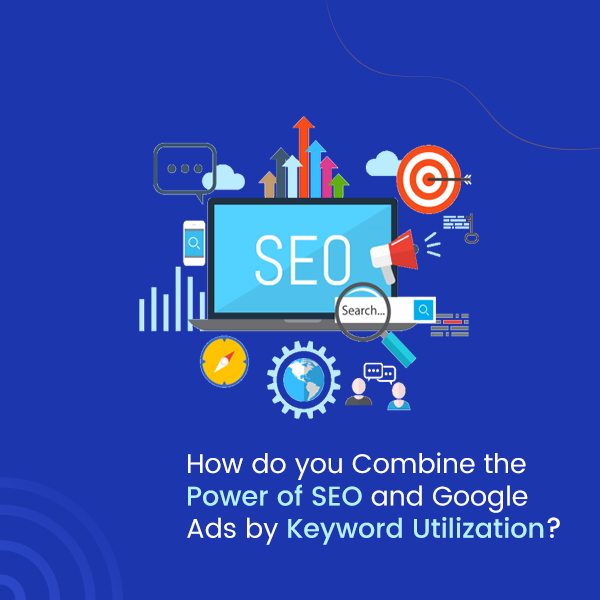
The power of SEO and Google ads is not the same by themselves; you can now think of SEO and PPC in the same way.
The big secret behind this combination is that when these two get paired together, they will provide you with a “digital marketing double whammy“. The strategy of marketing is based on SEO and PPC, which will either lead to success or failure. Any business that doesn’t diversify the way will get customers will not realize its full potential. SEO and PPC are commonly used to achieve the goal of search engine marketing. It would not survive if the targeted keywords were not there. Because both strategy have user intent and search demand, you can do the following thing:
- Create an organic and paid strategy that exceeds your competitors and optimize your budget.
- Maximizing efficient content production that will be used for both SEO and PPC.
- The SERP is expanding its reach for creating brand awareness by ranking both organic and paid content.
- Inform the PPC data with an SEO campaign and vice versa.
- Attain both short-term and long-term business goals.
- Only when approached correctly will the combination of SEO and PPC be able to unlock significant opportunities for your brand.
A synopsis of SEO and PPC :
Let us see a quick overview of the similarities and differences between these powerful strategies so that it will become easy to combine both SEO and PPC into a search engine marketing (SEM) strategy:
| Similarities | Differences | ||
| 1. | SERP targeting. | 1. | Time to achieve the goal. |
| 2. | Importance of search intent, demand and competition. | 2. | Calculating cost and return on investment. |
| 3. | The goal is to attract relevant customers. | 3. | Task specific abilities. |
Let’s discuss this furthermore in detail :
The difference between SEO and PPC :
1. Time to achieve the goal :
Starting PPC is quite easy, while SEO is a long-term process. When SEO is mainly structurally based, PPC is quick, focusing mainly on landing pages and click-through rates.
Since processing the PPC is faster when coming to the cost, this will cost more in the long run. We already know that advertising requires constant payment for sustained, where any SEO Company in India will result only if we have published content. The best way to balance both of them is by using PPC to power up the engine, but let SEO will be the consistent fuel that keeps the engine running.
2. Calculating the ROI :
For calculating the SEO ROI, use this formula.
Gain from investment=(Cost of the investment)/(Cost of the investment)
It’s a B2B lead-based business, so calculating SEO ROI is much more complex than e-Commerce. With B2B, you have to track the organic traffic of pages intended for lead generation, like your contact page or inquiry form success page, since there is no direct website sale.
The PPC ROI is found by observing the CTR and conversion will be rate in comparison with the number of sales. The main aim is that you should get more sales, which gives you more income than what you have paid in advertising and campaign management. Tools such as “Google Data Studio” that integrate with your CRM make possible PPC to calculate the ROI.
3. Skills required for doing SEO :
SEO may be free if it is done on your own. SEO may be chargeable if you take help of an expert, there’s still a lot of blood, sweat, and tears that go into a successful strategy. The skills of SEO are content writing, ability to use CMS, SEO tool know-how, keyword research and SERP analysis. If you hire an SEO strategist, they will make your plan work in a fast-forward way because their process is developed and proven.
On the other hand, skills required in PPC are copywriting, analytics and conversion tracking, keyword search, SERP analysis, and the ability to use the Google Ads platform. There are even many more skills there in PPC, but those majorly cover the overarching skills.
The Similarities between SEO and PPC :
The best similarity between them is that they mainly target the SERPs. Finally, the keyword process for both should always have the user intent in mind and consider the search demand.
Long-tail SEO keywords look like this;
- Tax software for small businesses
- Digital tax software for entrepreneurs
PPC keywords separated into four categories;
- Matching phrases – The ad is shown if there are different words used before or after the keyword you are targeting.
- Negative match – A word or words that you don’t wish to target during the video is running.
- Broad match – A general phrase or word you would like to target.
- A perfect match – an exact word/phrase you would like to target.
Organic keywords play a very important role in SEO strategy, while PPC keywords are the most crucial in the ad copy. Finally, both share the same goal: attracting the relevant users of your website to turn them into customers.
The following are the primary goals of combining SEO and Ads :
Combining these two has three primary goals;
- This will increase visibility.
- Testing keyword performance
- Using Adwords keyword data to inform organic SEO strategy.